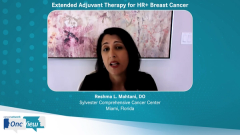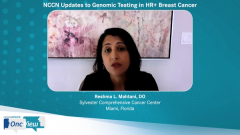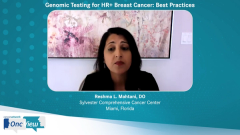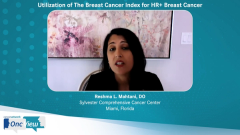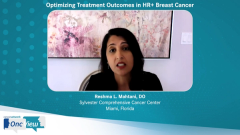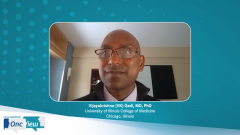
Role of Genomic Testing in HR+ Breast Cancer
Best practices for the appropriate and timely use of genomic assays in clinical practice for patients with HR+ breast cancer.
Episodes in this series

Kristie Kahl: What are the genomic assays, and what is their role in early stage breast cancer?
Vijayakrishna Gadi, MD, PhD: This is an ever-growing list. For the sake of argument, I’m going to restrict it to the ones where the level of evidence has risen to such a degree that it’s incorporated in our conventional guidelines that we use to take care of patients. I will start with probably the most common and well known, which is something called a 21-Gene Recurrence Score, also known as the Oncotype DX. This is a gene recurrence algorithm that looks at a handful of genes that are focused on estrogen receptor signaling, focused on HER2 [human epidermal growth factor receptor 2] signaling and on proliferation. When they put those together, they were able to be not only prognostic—yes, this cancer could come back compared with this other 1—but also predictive for benefit from, specifically, chemotherapy. The clinical trials performed were to see if they could distinguish those who had the greatest benefit from chemotherapy vs those who did not. Fortunately, those clinical trials were large. They rate out over the last several years, and they look like they can tell us that, yes, this is helpful in this regard.
Another test is the 70-Gene Recurrence Score, or the MammaPrint, and this also has been validated and vetted in a rigorous manner. They were mostly focused on prognostication, but you can derive from those trials that there’s also some benefit from chemotherapy vs not in certain groups. It is a complicated and controversial topic, but it also has level 1 evidence for its use and could be considered in early stage breast cancer. In addition, there is a 50-gene score called the Prosigna, and there’s a 12-gene score called the EndoPredict. They’re less well validated, and they’re prognostic. At this time, they are not validated for predictive benefit from chemotherapy or for endocrine therapy. Those are the other tests we use, and most of those are used in the really early stage setting. Finally, there’s the Breast Cancer Index, which is this smaller set of genes. It’s only 2 genes for the predictive benefit and a suite of 11 genes for the prognostic benefit.
Kristie Kahl: When do you do genomic testing in your patients with hormone receptor–positive breast cancer? Do you test all patients?
Vijayakrishna Gadi, MD, PhD: I will answer the first part and talk about when. The second part is a more complicated answer. When patients with early stage breast cancer are contemplating surgery, being worked up in this multidisciplinary manner, I will oftentimes introduce the concept of “we are going to get this test to help figure out whether you need chemotherapy.” That’s how I frame it for those patients early on in the process, so there are no surprises once the final pathology is back in terms of our recommendations around chemotherapy. That is early, and those are primarily the 70-Gene MammaPrint score or the 21-gene Oncotype score.
In terms of the extended therapy, I don’t do that right out of the gate. I tend to focus on ordering that toward the end of the antiestrogen therapy. So, if a patient has been on treatment for 4½ years, then during that visit before the last visit when they approach 5 years, I will introduce the concept that I’m going to order this test to see if the patient needs to be on this drug for longer. That way, I have the patient well prepared for that decision at that time. I do introduce the concept much earlier, but that is actually when I order it.
In terms of who gets the test and who does not, I have a personal preference to practice medicine in a shared decision-making model. For me, this means going through the pros and cons of the test, explaining that this is the information we’re going to unearth, and discussing whether the patient is going to be comfortable knowing that and then acting on that. If a patient says to me, “I don’t care what you do. I don’t care what that test says. I’m not doing those things,” then I’m not going to burden them with that information. That’s the model I have with my patients. But there are cultural, age-related, and temperament issues. For some patients, I will take a paternalistic model and just order the tests as I think they should be done. But for most of my patients, I have a conversation. If they meet the criteria for having the test ordered and it being useful, I will share that information with them, and we make that decision together.
Transcript edited for clarity.
Newsletter
Stay up to date on recent advances in the multidisciplinary approach to cancer.


